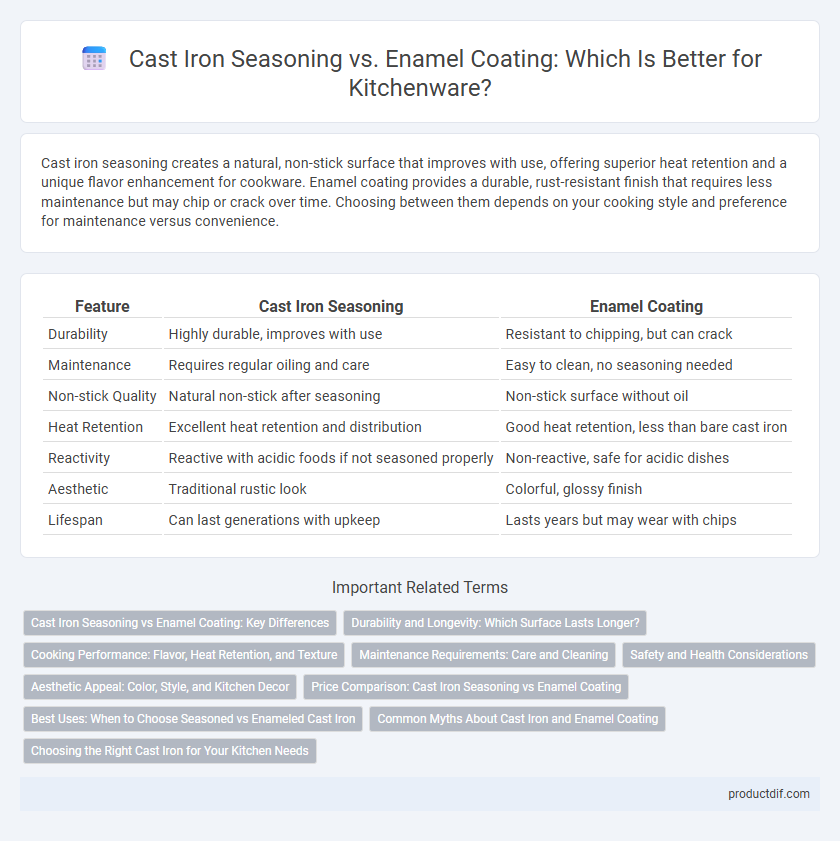Cast iron seasoning creates a natural, non-stick surface that improves with use, offering superior heat retention and a unique flavor enhancement for cookware. Enamel coating provides a durable, rust-resistant finish that requires less maintenance but may chip or crack over time. Choosing between them depends on your cooking style and preference for maintenance versus convenience.
Table of Comparison
| Feature | Cast Iron Seasoning | Enamel Coating |
|---|---|---|
| Durability | Highly durable, improves with use | Resistant to chipping, but can crack |
| Maintenance | Requires regular oiling and care | Easy to clean, no seasoning needed |
| Non-stick Quality | Natural non-stick after seasoning | Non-stick surface without oil |
| Heat Retention | Excellent heat retention and distribution | Good heat retention, less than bare cast iron |
| Reactivity | Reactive with acidic foods if not seasoned properly | Non-reactive, safe for acidic dishes |
| Aesthetic | Traditional rustic look | Colorful, glossy finish |
| Lifespan | Can last generations with upkeep | Lasts years but may wear with chips |
Cast Iron Seasoning vs Enamel Coating: Key Differences
Cast iron seasoning develops a natural, non-stick surface through polymerized oils, enhancing flavor and improving with use, while enamel coating provides a smooth, durable, and rust-resistant layer requiring less maintenance. Seasoned cast iron offers superior heat retention and can withstand higher temperatures, making it ideal for searing and frying, whereas enameled cookware is more versatile for acidic foods and easier to clean. Understanding these differences helps cooks choose between the traditional seasoning process that evolves over time and the convenient, low-maintenance enamel finish.
Durability and Longevity: Which Surface Lasts Longer?
Cast iron seasoning develops a natural, non-stick layer that improves durability with regular use, often lasting decades when maintained properly. Enamel coatings provide a hard, protective surface resistant to rust and easy to clean but can chip or crack over time, reducing longevity. For long-term resilience, seasoned cast iron typically outlasts enamel-coated cookware if cared for correctly.
Cooking Performance: Flavor, Heat Retention, and Texture
Cast iron seasoning enhances cooking performance by creating a natural non-stick surface that improves flavor development through the accumulation of seasoned oils, while enamel-coated cookware offers superior heat retention and even distribution without requiring ongoing maintenance. The seasoned cast iron imparts a unique texture and depth to dishes, particularly when searing or frying, whereas enamel coatings provide a smooth, non-reactive surface ideal for acidic and delicate foods. Both materials excel in heat retention, but cast iron's porous seasoning layer contributes to richer flavor profiles and a preferred crust formation in cooking.
Maintenance Requirements: Care and Cleaning
Cast iron seasoning requires regular oiling and careful drying after each use to maintain its non-stick surface and prevent rust. Enamel-coated cookware demands gentle cleaning with non-abrasive sponges and mild detergents to avoid chipping the protective enamel layer. Both types benefit from avoiding dishwasher use and harsh scrubbing for long-lasting durability and performance.
Safety and Health Considerations
Cast iron seasoning creates a natural non-stick surface through polymerized oils, which is free from synthetic chemicals and safe for high-heat cooking, though it requires regular maintenance to prevent rust and contamination. Enamel coating on cast iron provides a non-reactive, smooth surface that resists rust and eliminates the need for seasoning, reducing the risk of exposure to iron particles but may chip, potentially exposing bare cast iron underneath. Both options support health-conscious cooking, with cast iron adding dietary iron and enamel reducing the risk of iron leaching, making safety dependent on proper use and care.
Aesthetic Appeal: Color, Style, and Kitchen Decor
Cast iron seasoning develops a rustic, matte black finish that deepens with use, offering a timeless, vintage aesthetic ideal for traditional or farmhouse kitchen decor. Enamel coating provides vibrant, glossy colors ranging from deep reds to bright blues, enhancing modern or eclectic kitchen styles with its smooth and easy-to-clean surface. Choosing between the two depends on desired color vibrancy and whether a classic or contemporary look best complements the kitchen ambiance.
Price Comparison: Cast Iron Seasoning vs Enamel Coating
Cast iron cookware with seasoning typically offers a lower initial cost compared to enamel-coated options, making it a budget-friendly choice for many home cooks. Enamel coating adds durability and ease of maintenance but drives up the price due to the added materials and manufacturing process. Over time, cast iron seasoning may require more upkeep, while enamel coatings preserve the cookware's surface, influencing long-term value considerations.
Best Uses: When to Choose Seasoned vs Enameled Cast Iron
Seasoned cast iron is ideal for high-heat cooking methods such as searing, frying, and baking, offering a natural non-stick surface that improves with use. Enameled cast iron is perfect for slow-cooking, simmering, and acidic dishes like tomato sauces due to its non-reactive, easy-to-clean surface. Choose seasoned cast iron for durability and enhanced flavor development, while enameled cast iron excels in versatility and low-maintenance care.
Common Myths About Cast Iron and Enamel Coating
Common myths suggest cast iron cookware requires frequent seasoning to prevent rust and maintain a non-stick surface, but modern pre-seasoned options minimize this upkeep. Enamel-coated cookware is often believed to be scratch-proof and maintenance-free; however, the enamel layer can chip or crack if mishandled, compromising its durability. Both cast iron seasoning and enamel coating offer unique benefits and limitations that impact longevity, cooking performance, and care requirements.
Choosing the Right Cast Iron for Your Kitchen Needs
Cast iron seasoning creates a natural non-stick surface that improves with use, offering superior heat retention and flavor enhancement, ideal for high-heat cooking and searing. Enamel coating provides a rust-resistant, easy-to-clean surface without the need for seasoning, perfect for low-maintenance cooking and acidic dishes. Selecting the right cast iron depends on your cooking style, maintenance preference, and desired durability, with seasoned cast iron favored by traditional chefs and enameled options suited for versatile, everyday use.
Cast iron seasoning vs Enamel coating Infographic

 productdif.com
productdif.com